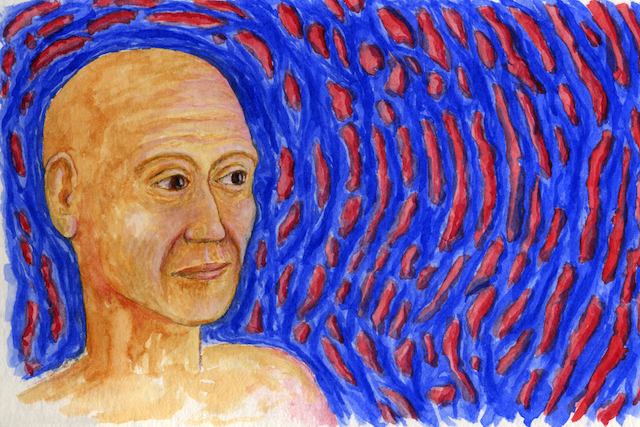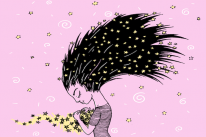
“If the only thing people learned was not to be afraid of their experience, that alone would change the world.” ~Sidney Banks
I spent most of my life scared of my feelings. Having feelings and expressing them made me mentally ill—or so I was led to believe by a large number of mental health professionals. When I felt sad, they labeled me as depressed. When I showed any signs of anxiety, they gave me another list of mental health disorders I needed medication for. And if I was angry? Oh well, that was the absolute worst. That clearly proved how insane and utterly out of control I was!
I didn’t understand how they couldn’t see what was really going on for me. I couldn’t understand how everyone saw me as the problem when what was happening to me was the actual problem. But that’s a story for another time.
I was brought up to be a good girl, which meant that any angry expressions were forbidden, shamed, and punished.
I wasn’t allowed to express disappointment because that made me ungrateful.
I couldn’t ask for what I wanted because that made me greedy.
I wasn’t allowed to disagree with anyone because that made me difficult.
I couldn’t express frustration because that meant I was out of control and needed to be left alone to think about my shameful behavior.
I didn’t ask for help because good girls don’t inconvenience other people.
I couldn’t be happy either because that made me attention-seeking and annoying.
I felt all the feelings, but I was taught that they were wrong, forbidden, and shameful, so it didn’t feel safe to feel them. And so I tried to suppress them. I inhibited them, pushed them away, avoided them, shamed them, and feared them.
Every time I felt something, I saw it as more evidence for how bad I was. Later on, I saw it as evidence for how broken and mentally insane I was. It drove me crazy. But it was thinking that having feelings made me insane that actually drove me insane.
I believed that what I was experiencing was wrong. I saw my feelings as problems, so I tried to hide them and not feel them. So much so that I don’t even recall feeling very happy or excited about anything. All I remember is feeling tired, lethargic, and bored. I wasn’t even fifteen years old at that time …
I continued like this for a very long time. My life felt lifeless and bleak. I don’t recall having any fun, adventures, or exciting experiences. Everything just seemed so hard. Life was something to endure, not enjoy. Enjoyment seemed to be reserved for a lucky few, and I most certainly wasn’t one of them.
It wasn’t until I was in my thirties that I learned that my feelings weren’t problems, and that they didn’t make me insane. My feelings only made me one thing—human.
Feelings Lesson 1: Feelings aren’t evidence that we are broken or insane. They are evidence that we are human.
I know now that I had always been perfectly healthy, but others taught me to believe that being a little human with feelings was somehow wrong and shameful.
My feelings were a problem for others. They were inconvenient to them. And as a result of them not dealing with their own feelings—their own irritation, intolerance, and impatience—they tried to control and eliminate mine.
But what happens when we try to control or eliminate our feelings is that we deprive ourselves from experiencing the richness of life. We numb them all because we cannot selectively numb. We feel it all or nothing at all.
So if I am unwilling to feel my anger, I will eradicate other feelings with it—apart from maybe one or two that will be expressed more strongly than they would if we only let ourselves feel whatever it is that we actually need to feel.
Feelings Lesson 2: We are meant to feel all our feelings and can’t selectively numb them.
In my professional work, I have noticed that sad people usually suppress their anger and angry people usually suppress their sadness. It’s a simplistic generalization, but it is largely true. The problem is that the displaced feeling will be way more powerful and destructive than it would be if we didn’t try to control or avoid it. We avoid a feeling when it is shame-bound, when every time it arises we feel shame for feeling it.
If we feel something excessively and intensely, it’s a sign that we have shame-bound another feeling, which means that this feeling was not tolerated in our childhood, and every time it arises, our anxiety level rises. We then try to push it down to stop ourselves from feeling it, but then the energy of that feeling gets displaced and added to a feeling we believe to be more acceptable to feel and express.
The ‘more acceptable’ feeling then takes on a bigger form, and we end up having panic attacks instead of expressing our frustrations about someone. Or we get depressed instead of setting boundaries with people who treat us in disrespectful ways. Or we explode in a rage because we don’t allow ourselves to admit to feeling hurt, alone, and unsupported.
There are thousands of examples like the above. Sadly, we always believe that our misdirected expression like rage or depression is the problem we need to fix, and so we focus on the result of the problem and not on its actual cause, which means that we cannot solve it.
If we want to work through our issues, we need to identify which of our feelings are shame-bound and then reconnect with them in healthy and compassionate ways. This is a process. We are going against a lifetime of conditioning, so we need to be gentle with ourselves while persevering and getting honest with ourselves.
But it is possible. We can remove the shame-binding from all of our feelings by reminding ourselves that our feelings aren’t problems, and that feeling our feelings is what makes our human experience special.
Feelings Lesson 3: Shame-bound feelings express themselves in different and destructive ways, meaning we simply can’t not feel.
When we inhibit what we are meant to express to protect others from our feelings, because we perceive that they’re a problem for them, we reinforce the message that our feelings are problems and that we are wrong to feel them. Believing this will negatively impact our mental health and enjoyment of other people and life in general, because feelings exist for our benefit.
Our feelings exist to guide us through life. They show us what we want and what we don’t want so we can create more of the former and move away from the latter. When someone shames our feelings and encourages us to disconnect from them, they encourage us to disconnect from our emotional guidance system, which serves to help us create a great life for ourselves in which we can grow and thrive. This inevitably leads to creating an inauthentic, unfulfilling life, and stunted development.
Our feelings also show us when we believe something harmful that isn’t true: a lie of the mind.
If I believe that my anger is a sign that I am an inherently flawed human being, I feel distressed because this isn’t true. My guidance system is trying to tell me that I’m on the wrong track.
Because just like the physical pain we experience when touching something painfully hot, emotional pain tells us to move away and let go of a harmful thought. And so, our emotions highlight our state of mind. They encourage us to let go, drop, and move away from anything that doesn’t serve us or promote our personal growth.
Feelings Lesson 4: Our feelings tell us when we engage in harmful thinking.
Once we understand the purpose of our feelings, we begin to see the beauty in them. We are made to have feelings—all the feelings! We are meant to feel our feelings. Our feelings aren’t problems. They are just here to give us the full human experience. And there is absolutely nothing wrong with that! We have the potential to experience it all. It is a once-in-a-lifetime opportunity!
But we cannot make the most of this opportunity if we go in blind. Being cut off from our feelings is just that. It’s like trying to sail the oceans without a compass, hoping to find paradise to live in. It’s navigating life without any sense of what we want or what is good and healthy for us. As a consequence, we make many wrong choices and keep believing all the wrong things.
Our attention then goes into fixing our mistakes instead of creating a life that is most suited to who we really are. Because we simply don’t know what’s good for us and what isn’t because we don’t know what we are feeling. We are emotionally disconnected.
We have feelings that try to move us toward what’s good for us, but because we don’t like how some of them feel, we disregard them all. We try to create a successful life without any sense of what successful actually looks like for us.
Let me outline this with an example:
What was my anger during my childhood trying to tell me?
It definitely wasn’t that I was a bad and ungrateful child who was inherently flawed and devoid of any tender human qualities. My anger didn’t mean that I was disrespectful or manipulative and deserved to be hit, shouted at, shamed, and punished. My anger was trying to get me to act, to stand up for myself, to protect myself. Only I was too little.
Then.
Not now.
But I lived by those shame-bound rules for most of my life. I hated my anger. I avoided conflict. I didn’t stand up for myself when it mattered and then got myself into situations that were abusive, full of conflict, draining, and traumatic—but also unnecessary.
If I had been attuned to my anger, if I had responded to it immediately, nothing would have ever needed to escalate. I would have stood up for myself and moved away from whoever and whatever wasn’t healthy for me and didn’t contribute positively toward my growth.
I would have made very different choices and I would have lived a very different life.
Being cut off from my feelings and disconnected from my internal guidance system deprived me of the experience of life I wish I’d had.
I was doing it the hard way. I was trying to succeed going in blind. It doesn’t work. I know you know that too.
Feelings Lesson 5: Our feelings ask us to act in ways that are good for us.
So why am I going on about feeling our feelings? Because it’s the solution to many of our problems.
Instead of putting all our energy into avoiding, controlling, and eliminating our feelings, we have to become attuned to them. We have to reconnect with them so we can make better and healthier choices for ourselves. We need them. We are meant to have them. And the more we let ourselves feel them, the more easily we learn to respond to them in healthy and life-enhancing ways.
Because our feelings aren’t problems. They are not inconvenient. They are trying to move us into the direction of health and well-being on a physical, emotional, and mental level.
And in that way, they help us create a life we can actually enjoy. But only if we allow ourselves to feel them.
About Marlena Tillhon
Marlena is a highly experienced psychotherapist and success coach specialising in healing inner trauma and breaking unhealthy patterns that stop her ambitious clients from having the success they know they can have in their lives, relationships, and careers. You can find her on Instagram or Facebook and receive her free training and gifts on her website.













 Though I run this site, it is not mine. It's ours. It's not about me. It's about us. Your stories and your wisdom are just as meaningful as mine.
Though I run this site, it is not mine. It's ours. It's not about me. It's about us. Your stories and your wisdom are just as meaningful as mine. 